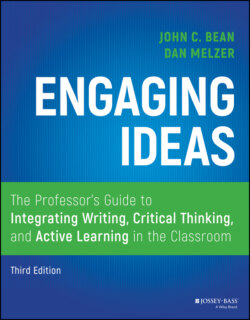Читать книгу Engaging Ideas - John C. Bean - Страница 65
Why Don't Students Revise?
ОглавлениеIf one of our major goals is to teach thinking through revision, we need to understand more clearly why students do not revise. Our first tendency may be to blame students' lack of motivation or their ineffective time management. They do not revise because they are not invested in their work or do not care about it or simply put off getting started until the night before a paper is due. But other explanations should also be considered.
For example, one hypothesis, influenced by Piagetian theory, argues that revision requires the ability to “decenter” (Bradford, 1983; Kroll, 1978)—that is, to think like a reader instead of a writer. One of Piaget's observations is that persons identified as concrete operational reasoners have difficulty switching perspectives. If sitting in the back of a classroom, for example, a person may have trouble sketching the room from the perspective of a lecturer standing in front. By analogy, novice writers may have difficulty imagining their drafts from a reader's perspective. If a passage seems clear to the writer, he or she believes that it ought to be immediately clear to the reader also. Novice writers may simply not recognize their reader's confusion and consequently not recognize the need to fill in gaps, to link new information to old information, or to arrange material in the order needed by readers.
Related theories emphasize students' lack of familiarity with academic genres or with the complexity of addressing rhetorical problems (purpose, audience, genre) as well as subject matter problems. What drives revision for mature writers is their awareness of the complex conversation that a piece of writing must join—how its argument must accommodate objections raised by a skeptical reader, for example, while also following the conventions of the genre and contributing something new to the conversation. Expert writers can concentrate on only one or two problems at a time. They need multiple drafts in order to work through their many different goals and rhetorical constraints.
Another contributing factor may be the difficulty of getting a bird's‐eye view of a draft when composing on screen. During the early days of word processing, several researchers (Daiute, 1986; Hawisher, 1987) showed that although word processing facilitates sentence‐level revision as well as some larger‐scale revisions such as additions, deletions, and block moves of text, it may actually discourage major reconceptualizing of a text—the kind of global revision that leads to substantial dismantling and rewriting. By revising from the screen rather than from a hard copy, writers see only narrow windows of their text rather than the whole. Global revision often requires the writer to revisit earlier passages, to compare, for example, a point being made on page 7 with what was forecast on page 2. Such a bird's‐eye overview of a text is easier with hard copy than on screen, where scrolling backward is time‐consuming. (The difference between revising on screen versus paper is analogous to reading on an e‐reader such as Kindle versus on paper, where you can quickly flip to the table of contents, the index, or previous pages.)
Whatever the cause of students' failure to revise, teachers need to create an academic environment that encourages revision. The importance of revision has been highlighted by the NSSE/WPA research on writing assignments that contribute to deep learning (Anderson, Anson, Gonyea, and Paine, 2015, 2016). This research identifies the presence of “interactive elements” in an assignment as the first of three criteria for best practices. These interactive elements include building into the assignment opportunities for in‐class brainstorming, peer review, teacher feedback on drafts, or visits to a writing center. (See chapter 4 for further discussion of the NSSE/WPA research.)
